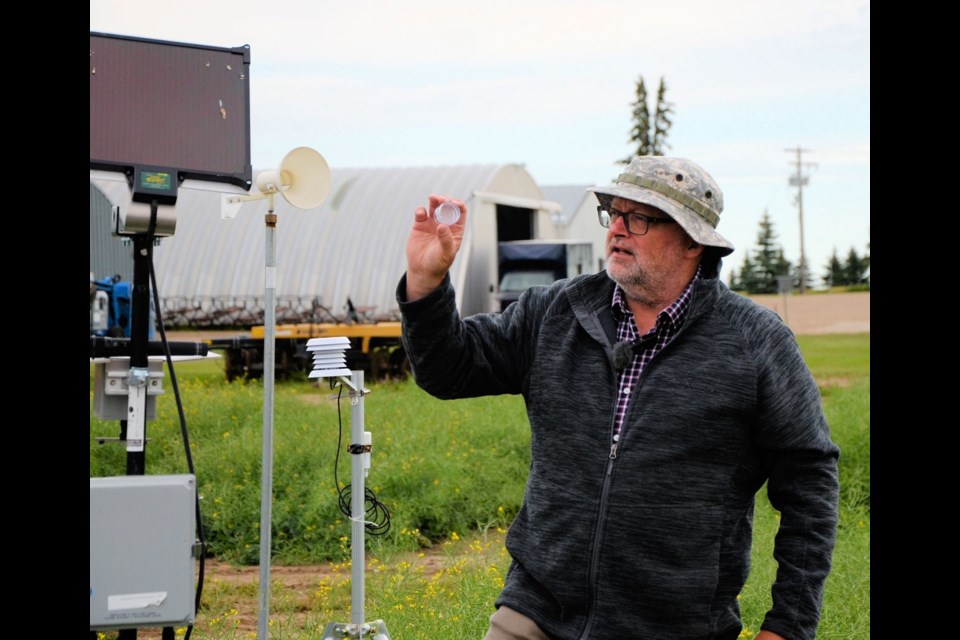SCOTT, Sask. — A canola-specific field day was held at Scott Research Farm Aug. 10, co-hosted by co-hosted by SaskCanola, Western Applied Research Corporation and Agriculture and Agri-Food Canada.
Topics covered included harvest timing, improving the management of sclerotinia stem rot, canola seed safety and yield response to novel phosphorus amendments, managing glyphosate-resistant kochia and how to check for the relatively new soil-borne disease of verticillium stripe. There was also a presentation on the ongoing third-party canola performance trials, comparing seed varieties with one another.
Dr. Kelly Turkington, a plant biologist research scientist with AAFC in Lacombe, Alta., described the decision to use or not use fungicide for sclerotinia as “very stressful” for producers. Applying fungicide is “only a benefit if there is a risk of disease” but the risk generally has to be assessed and the decision made before symptoms can be seen in the field.
The trial Turkington is overseeing is using two seeding rates and nine different timings of fungicide treatments. There are 10 sites in Canada conducting the same tests, including one in Quebec as well as sites in Alberta, Manitoba and Saskatchewan. Early application of fungicide, at the early yellow bud stage, allows the product to get into the lower canopy. This early application is being compared to treatment one, two, three and four weeks afterwards.
Turkington also showed off some newer risk assessment tools, including the Spornado. The Spornado is a funnel with a filter cartridge which captures airborne spores. Placed in the centre of or at the downwind corner of a canola field, the cartridge can later be removed and sent to a laboratory for analysis to determine the amount of sclerotinia spores, if any. Capture of the spores provides early detection of a potential infection.
Prabhath Lokuruge, co-ordinating biologist at AAFC in Scott, and Cindy Gampe, research assistant in plant biology, spoke on the trial looking at glyphosate-resistant kochia in canola. The trial is being conducted in a sheltered field, surrounded by trees, in order to contain the spread of the kochia.
Lokuruge said the goal is to determine some thresholds, including the economic threshold at which the weed density becomes so much that the value of the crop yield merits the cost of a second herbicide application. Another option is to set a predetermined action threshold, where one automatically sprays if and when the weed density reaches a certain percentage, such as five or 10 per cent. Also important for future weed management is to set a weed seed production threshold.
Gampe pointed out that, while reducing seeding rates is sometimes recommended for lowering input costs, lower seeding rates are not necessarily the best option for weed resistance.
Verticillium stripe is a new disease in Western Canada which started in Manitoba and is gradually moving west. Courtney Boyachek, agronomy specialist with the Canola Council of Canada, encourages producers to start scouting for this disease.
Verticillium is a soil-borne disease, like clubroot, and gets into the vascular part of the plant tissue, moving up into the stalk and stopping the transference of water and nutrients. If one side of a canola plant is yellowing, she suggests cutting the stalk lengthwise. If you see black, it is a blackleg infection. If you see stripes, it is verticillium.
There are no fungicides yet for combatting verticillium, nor are there any genetically resistant canola varieties. Therefore, prevention is important. Sanitizing equipment, kicking off clumps of dirt when moving between fields, wearing disposable booties in the field, rotating crops and eliminating volunteer canola plants are all suggested strategies.
The morning tour provided great information for canola producers as well as agronomists attending from various agricultural companies. Before leaving, attendees were encouraged to pick up blackleg and clubroot test kits, provided free of charge by SaskCanola, in collaboration with the Saskatchewan Ministry of Agriculture. Producers and agronomists can also reach out to SaskCanola, the ministry’s regional offices, SARM plant health officers and some RM offices for these test kits.




